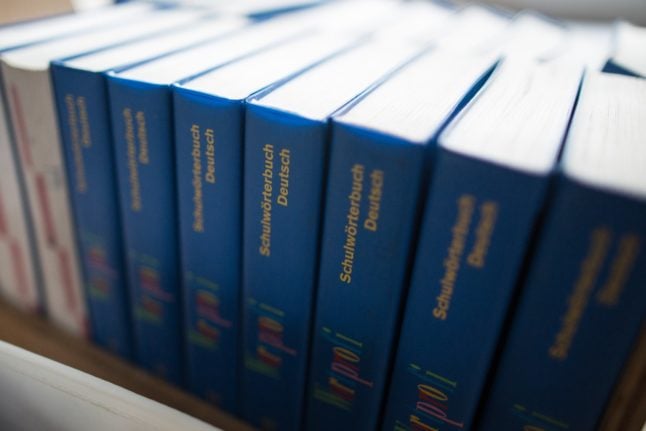Chancenkarte: How many points could you get on Germany's planned skilled worker visa?

Under plans passed by the cabinet on Thursday, non-EU citizens will in future be able to apply for a special permit to look for a job in Germany - provided they score enough 'points' on things like language skills and qualifications. Here's how many points you could get.
What's going on?
After months of hype, Germany's new Skilled Workers Immigration Act is finally on its way. On Thursday, the cabinet passed a draft of the law, paving the way for it to be voted on in parliament.
Alongside simplified routes for skilled workers to enter the country and incentives for Blue Card holders, the government wants to launch a new jobseekers' visa aimed at qualified professions.
The Chancenkarte - or Opportunity Card - will be primarily based on a points-based system. It will allow foreign workers to enter the country and work for up to 20 hours a week while they look for a job in their field. It can be granted for up to a year but can't be extended if the job hunt is unsuccessful.
READ ALSO: German government signs off on sweeping reforms for skilled worker visas
How many points do I need?
To be eligible for an Opportunity Card, you'll need to score at least six points out of 14. Your constellation of points will depend on your life situation, but there are some criteria everyone has to fulfil before they can apply.
To be in with a chance of getting a Chancenkarte via the points-based system, you need:
- At least sufficient German (i.e. B1 level) or fluent English (C1)
- Proof that you can support yourself financially, and
- A professional qualification or degree that required at least two years of training or study
Age: Up to 2 points
It may sound ageist, but how young you are - and, by extension, how many years you'll continue to work - can count towards your Opportunity Card application.
If you're lucky enough to be under the age of 35, you can net a full two points towards your application. If you're under the age of 40 but over 35 you can score one point towards it.
Language skills: Up to 3 points
If you already speak a bit of German, you should be able to score either two or three points towards your Opportunity Card.
According to the draft law, people with "good" German skills get three points, while people with "sufficient" skills get two.
So, what do good and sufficient really mean?
Well, while this isn't detailed in the draft, it's worth noting that elsewhere in German immigration law B1 is described as "sufficient". That would mean that you would likely get two points for B1 and three for B2 or above.
READ ALSO: How to apply for Germany's new 'Chancenkarte' and other visas for job seekers

German dictionaries in a language school. Good knowledge of German can net applicants up to three points. Photo: picture alliance / dpa | Marcel Kusch
Qualifications and experience: Up to 7 points
If you've completed a professional qualification that's considered equivalent to a German qualification - for example, a degree or training to obtain a licence to practice - you could net four points.
This can increase by three points if you've practiced in a field relevant to your qualification for at least three years out of the last seven.
Connection to Germany: Up to 2 points
Having a link to Germany of some sort can net you either one or two points towards your application, depending on how many of the criteria you fulfil.
The first way to prove a link to the country is to provide evidence that you lived here for at least six consecutive months in the past five years. You can earn one point for this.
The second is to get a sponsor to write a letter promising to assist you in your job search and integration into the labour market. This should be an individual rather than a company and they should have resided in Germany for at least five years. It's important to note that they shouldn't have provided a letter like this for anyone else. This sponsorship will net you one point.
READ ALSO: Will immigration reform be enough to combat Germany’s worker shortage?
What else should I know?
There is another route to getting hold of an Opportunity Card: being what's known as a 'skilled worker'.
It's not entirely clear what the government's definition of a skilled worker is, but generally you would have completed a qualification that's required in your field and accrued a certain amount of professional experience.
It's also worth noting that, in some cases, you'll be able to apply for an Opportunity Card even if you live in Germany - but this will depend what kind of visa you are currently on and whether you fulfil the above requirements.
READ ALSO: COMPARED: Germany’s Chancenkarte vs. Austria's Red-White-Red card for skilled non-EU workers
Comments
See Also
What's going on?
After months of hype, Germany's new Skilled Workers Immigration Act is finally on its way. On Thursday, the cabinet passed a draft of the law, paving the way for it to be voted on in parliament.
Alongside simplified routes for skilled workers to enter the country and incentives for Blue Card holders, the government wants to launch a new jobseekers' visa aimed at qualified professions.
The Chancenkarte - or Opportunity Card - will be primarily based on a points-based system. It will allow foreign workers to enter the country and work for up to 20 hours a week while they look for a job in their field. It can be granted for up to a year but can't be extended if the job hunt is unsuccessful.
READ ALSO: German government signs off on sweeping reforms for skilled worker visas
How many points do I need?
To be eligible for an Opportunity Card, you'll need to score at least six points out of 14. Your constellation of points will depend on your life situation, but there are some criteria everyone has to fulfil before they can apply.
To be in with a chance of getting a Chancenkarte via the points-based system, you need:
- At least sufficient German (i.e. B1 level) or fluent English (C1)
- Proof that you can support yourself financially, and
- A professional qualification or degree that required at least two years of training or study
Age: Up to 2 points
It may sound ageist, but how young you are - and, by extension, how many years you'll continue to work - can count towards your Opportunity Card application.
If you're lucky enough to be under the age of 35, you can net a full two points towards your application. If you're under the age of 40 but over 35 you can score one point towards it.
Language skills: Up to 3 points
If you already speak a bit of German, you should be able to score either two or three points towards your Opportunity Card.
According to the draft law, people with "good" German skills get three points, while people with "sufficient" skills get two.
So, what do good and sufficient really mean?
Well, while this isn't detailed in the draft, it's worth noting that elsewhere in German immigration law B1 is described as "sufficient". That would mean that you would likely get two points for B1 and three for B2 or above.
READ ALSO: How to apply for Germany's new 'Chancenkarte' and other visas for job seekers

Qualifications and experience: Up to 7 points
If you've completed a professional qualification that's considered equivalent to a German qualification - for example, a degree or training to obtain a licence to practice - you could net four points.
This can increase by three points if you've practiced in a field relevant to your qualification for at least three years out of the last seven.
Connection to Germany: Up to 2 points
Having a link to Germany of some sort can net you either one or two points towards your application, depending on how many of the criteria you fulfil.
The first way to prove a link to the country is to provide evidence that you lived here for at least six consecutive months in the past five years. You can earn one point for this.
The second is to get a sponsor to write a letter promising to assist you in your job search and integration into the labour market. This should be an individual rather than a company and they should have resided in Germany for at least five years. It's important to note that they shouldn't have provided a letter like this for anyone else. This sponsorship will net you one point.
READ ALSO: Will immigration reform be enough to combat Germany’s worker shortage?
What else should I know?
There is another route to getting hold of an Opportunity Card: being what's known as a 'skilled worker'.
It's not entirely clear what the government's definition of a skilled worker is, but generally you would have completed a qualification that's required in your field and accrued a certain amount of professional experience.
It's also worth noting that, in some cases, you'll be able to apply for an Opportunity Card even if you live in Germany - but this will depend what kind of visa you are currently on and whether you fulfil the above requirements.
READ ALSO: COMPARED: Germany’s Chancenkarte vs. Austria's Red-White-Red card for skilled non-EU workers
Join the conversation in our comments section below. Share your own views and experience and if you have a question or suggestion for our journalists then email us at [email protected].
Please keep comments civil, constructive and on topic – and make sure to read our terms of use before getting involved.
Please log in here to leave a comment.